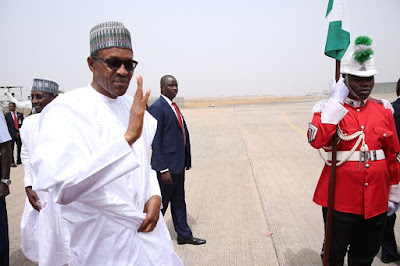By Henry Boyo
A seemingly
responsible fiscal plan will become unimplementable, in the modern era, if the
underlying monetary indices are out of sync with budget projections.
Conversely, the stubborn sustenance of appropriate monetary benchmarks for
inflation, cost of funds and exchange rate may still rescue the performance of
an otherwise bad budget.
 |
| *Buhari |
Buhari For example,
if salaries and other incomes double or triple summarily, as happened during
the Udoji salary awards of the 70’s, prices will spiral beyond the comfort
level of consumers, as the liberal Naira supply chase the relatively modest
output of goods and services on offer. Evidently, if inflation rate for
example, approaches 20%, as in our present predicament, then we would all have
lost a fifth of the purchasing power of our salaries and incomes.
The dwindling
purchasing power caused by inflation will invariably erode consumer demand for
goods and services, and also constrain domestic industrial output, while
further investment decisions will ultimately be kept on hold. Thus, in addition
to a significant loss in real income values and deepening social poverty, an
uncontrolled inflationary spiral will severely challenge the implementation of
any fiscal plan that does not accommodate the prevailing rate of inflation; for
example, the clearly recklessly ambitious 2016 N6tn budget, has become
difficult to implement because of reduced revenue and significant Naira
devaluation that has increased local production cost and further spurred
inflation closer to 20%.
For the above
reasons, Central Banks, in successful economies everywhere, endeavor to sustain
strategies that will keep money supply at an equilibrium level that will not
push inflation rate beyond say 3-4%, so as to conserve price stability. Similarly,
if foreign exchange is in short supply and auctioned in a market where Naira
supply is constantly in excess, the local currency will, invariably depreciate
in value, and also make all imports (including industrial raw materials)
correspondingly more expensive. Furthermore, the competitiveness of local
enterprise will become even more seriously challenged, if CBN’s MPC decides to
counter inflationary pressures by increasing the rates at which commercial
banks borrow from the CBN to as high as 14-16% as per their recent position in
July 2016.
The preceding
narrative hopefully explains the need for best practice management of money
supply to avert the disenabling and distortional consequences of spiraling
inflation in the economy. Clearly, horrendous inflation rates above 20% will
seriously challenge any attempt to diversify any economy or foster inclusive
economic growth. Indeed, if the inflation rate remains untamed, the Naira’s
purchasing power will become seriously diminished and the N1000 note may ultimately
be worth less than a dollar. Price stability is threatened and the economy will
invariably underperform whenever the CBN readily admits its unending engagement
in a very costly battle against perceived systemic surplus Naira.
So the critical
questions should therefore be, what causes the evidently systemic excess Naira
liquidity and why is CBN losing the battle to wrestle inflation to best
practice rates below, say 4% and protect our incomes and industries. Naira
supply will obviously increase if government continuously prints more Naira or
borrows heavily without caution to fund its budget, as clearly demonstrated in
the 2016 budget structure. Furthermore, Naira supply also increases
inordinately, whenever government’s forex receipts are directly substituted
with fresh Naira supply as allocations, while CBN keeps and auctions the
dollars. Fortunately, the CBN also has the option to modulate money supply by
establishing appropriate cash levels which banks must retain in relation to
their assets.









